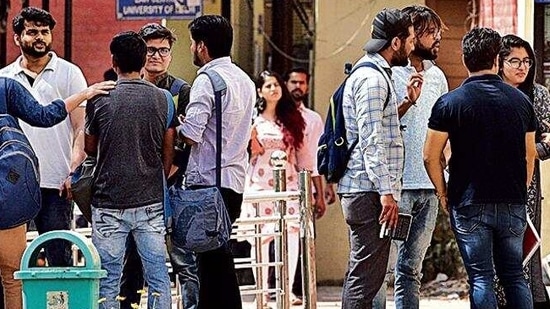Delhi: Scholars race against time to complete research work
In the last 12 months, MPhil and PhD scholars across universities were unable to conduct experiments in the university laboratories as they could not access library services, which is critical for completion of a thesis, or engage in field visits due to the lockdown.
Fareeha Iftikhar and Kainat Sarfaraz

htreporters@hindustantimes.com
New DelhiEven as universities across the national capital switched to the online mode for classes and exams over the last year amid the Covid-19 pandemic, many institutions were hard-pressed to find a digital alternative for research work.
In the last 12 months, MPhil and PhD scholars across universities were unable to conduct experiments in the university laboratories as they could not access library services, which is critical for completion of a thesis, or engage in field visits due to the lockdown.
Although the University Grants Commission (UGC), in view of the pandemic, has provided a six-month extension to PhD scholars scheduled to submit their thesis in December last year and June this year, many students said that they might still not be able to complete their thesis work. Research scholars and postgraduate students of science and technology programmes started resuming their work in labs in phases after a nod from the UGC in November.
Ishita Manna, a PhD scholar at the Jawaharlal Nehru University (JNU) whose soil samples were ruined due to the closure of the laboratory for over eight months, said that she will have to travel back to Beas Kund in Himachal Pradesh to collect new samples. The soil samples collected from different parts of the country were kept in the TL/OSL lab (thermoluminescence/optically stimulated luminescence), used by research students of the Centre for the Study of Regional Development (CSRD) at JNU. The samples were rendered useless due to a termite infestation in the building.
“I have to go back to collect fresh samples in May or June whenever the weather is better, and the snow melts. I don’t know if I will get the exact sample again or not. I can’t even change my research subject at this stage. If I don’t get samples, I will have to write in my PhD thesis about whatever has happened. I can’t wait any longer and lose one year. I have to complete my PhD and find a job,” she said.
The situation was worse for PhD students in far-flung areas with electricity and internet connectivity issues. Khalid Imtiyaz, a fourth-year PhD student at Jamia Millia Islamia whose area of research includes cancer cells, was planning to submit his thesis by the end of his fourth year itself. But he said it will have to wait now.
“My scholarship was valid only till the fourth year, so I had planned to finish my work by then. Currently, I am pursuing a PhD at my own expense. While researchers across the country and the world were unable to access their labs, students in Kashmir faced more challenges as our internet too wasn’t working. Downloading a single research paper often took around two days. As a result, we could not keep ourselves aware of the developments in our field of literature. Now that we have returned to universities, there is a huge backlog of work. I have not taken an off in the past three months,” he said.
Social sciences scholars also felt the heat of the lockdown. A PhD scholar at the JNU’s School of Social Sciences, whose research topic is “population studies”, said, “We can’t even start writing the thesis without proper field work. I was supposed to complete my field work last year and my thesis work by 2022. But since my field work was not done last year due to the pandemic, I could not start anything else as well. The deadline for completing my PhD is 2022. I am extremely anxious.”
Faculty members said as the labs remained inaccessible for several months it affected both equipment and research work. Moshahid Alam Rizvi, who teaches in the department of Biosciences at Jamia Millia Islamia, said, “While library resources were shared in digital format, many journals could only be accessed on university servers. Many researchers also lost their work because labs were shut for too long,” he said.
A professor at DU’s chemistry department, who wished not to be named, said, “Many of our students who have to submit their thesis in June are still lagging behind. They are still unable to use the laboratories properly since some of our equipments has been damaged during the lockdown.












